Featured Professional

Anna Haines
Anna is a qualified Equine Behaviour Consultant based in Cheshire, who has been around horses for most of her life, having started riding at the age of five. She is a regular contributor to Horse&Rider and is a member of our 'Ask the Expert' team.
So how do you tackle problematic behaviour? And how do you know when it’s time to call in the professionals? Anna Saillet explains…
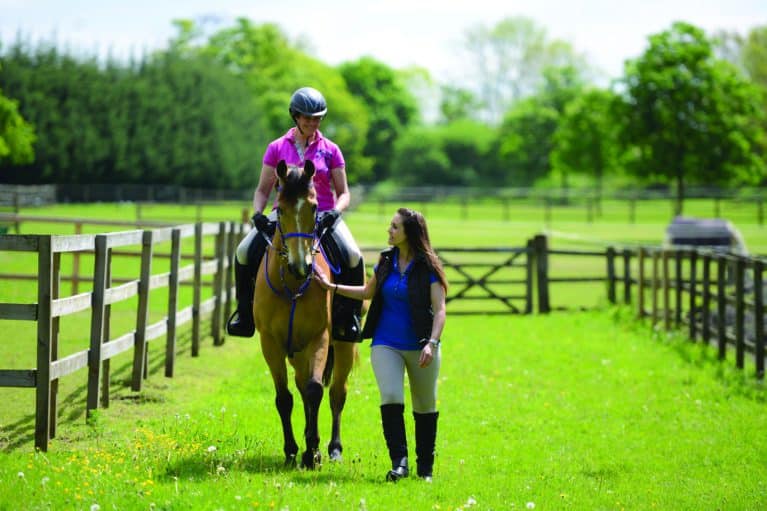
When the relationship between you and your horse starts to break down, it can often be difficult to know who to turn to for help. ‘Violence begins where knowledge ends’ – this is something that should always be considered before you take a somewhat violent approach towards your misbehaving horse. It is important to always remember that there’s a reason for every behaviour and your response to them will determine whether they increase or decrease in the future.
Unwanted advice
You’ll always have horse-owning friends and acquaintances desperate to give their opinions and, despite their advice often being totally conflicting, each and every one of them will be adamant that their suggestion is the only answer to your problem. Added to that, there is now an array of equine forums and social media pages where hundreds more people are desperate to pass on their wisdom to you, each of them with a different method that they convincingly tell you will solve your horse’s behavioural problems. This often means that by the time an owner makes that important call to an equine behaviourist, their horse’s behaviour problems have become more extreme and often dangerous.
One of the common questions that arises on horse forums is ‘My horse has started to bite me, what should I do?’. The plethora of responses you receive may suggest you do anything from ‘Bite him back – I bit my horse on the nose once and he never did it again’, to ‘Just whack him every time he does it, he’ll soon learn’, ‘Hold an up-turned needle in your hand with the spike just poking out, then jab it into his nose if he goes to bite you’ or ‘Put him in a round pen and do Join-Up with him. He obviously has no respect for you and needs to learn that you are his leader’. These answers are real suggestions from real people, responding to a genuinely concerned horse owner about how to manage her horse’s problematic behaviour. I wish I was joking, but sadly I’m not. And on the thread were many more ideas, most of them shocking at best and seriously dangerous to both horse and owner at worst.
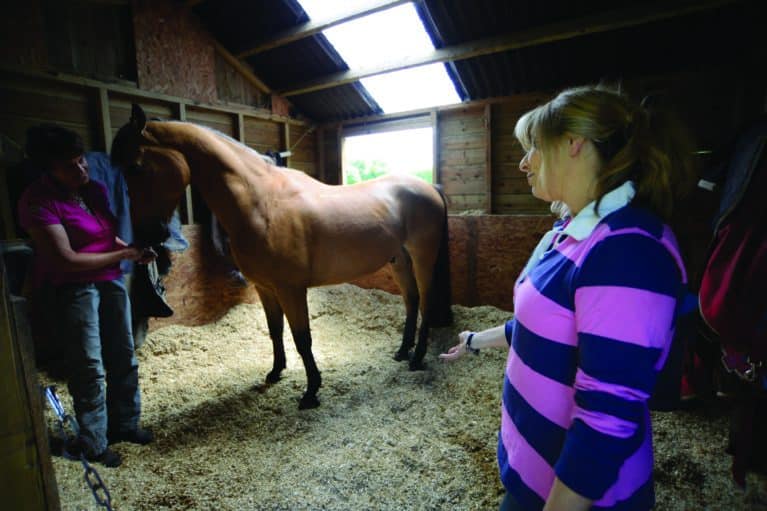
Get the right help
The field of equine behaviour and profession of equine behaviourist are relatively new and, as a result, people are often unclear of when to ask a behaviourist for help or even what exactly a behaviourist’s role is. Put simply, it’s about getting the right person for the job. For example, if your car started to make an unusual noise, you wouldn’t ask your driving instructor to fix it. If you were struggling to drive on busy roads and finding the experience nerve wracking and felt that you were in danger, your wouldn’t ask your mechanic to help you. If your car started to swerve dramatically while you were driving, you wouldn’t rely on advice from a friend or someone you’d never met on a social media site, on how to solve the problem just because they also drive a car every day. We all know that these things sound silly, so why do we do exactly this when we encounter a behavioural problem with our horses?
Riding instructors, physical therapists, yard managers and other equestrian professionals are excellent at what they do, but generally are not experts in equine ethology and behaviour or the application of learning theory. This means they’re unlikely to understand how best to approach a behavioural problem or how to provide behavioural treatment. Of course there are wonderful exceptions to that generalisation, where trained professionals in other areas have gone on to study behaviour, and equally there are behaviourists who have other skills alongside their behaviour counselling work, but it’s important for people from all professions to recognise and admit where their specialist knowledge ends, and when it’s time to call in someone who is more suitably trained for dealing with behaviour problems. A good equine vet will refer you to a qualified equine behaviourist to help with any behaviour problems.
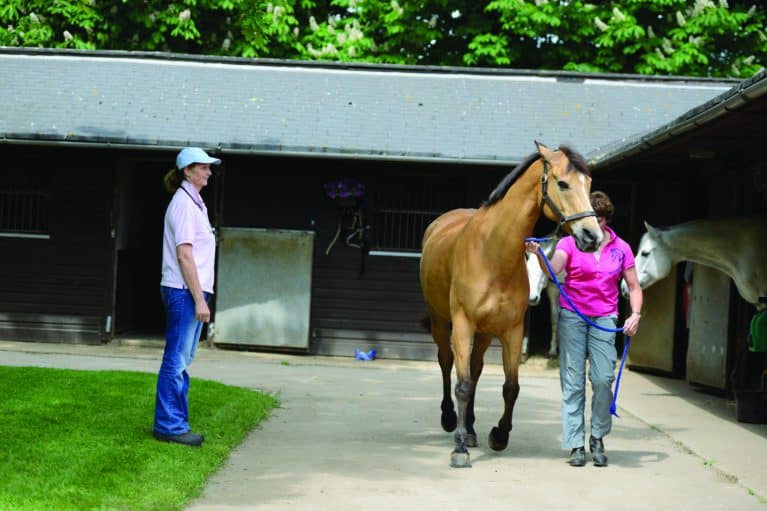
The importance of your vet
When there’s a change in your horse’s behaviour, it’s essential to understand why this change has occurred and what has caused it. Without a clear understanding of the motivations behind a behaviour problem, any treatment is likely to be similar to sticking a plaster on a broken leg. It may well cover up the small wound on the surface, but what lies underneath the skin, the most serious aspect, will not be helped.
The first, most important step for any behaviour change or problem is to call out your vet to eliminate pain as a cause for the unwanted behaviour. Many behaviour problems go hand in hand with pain, so it’s essential for your vet to rule this out before you take further action. If your horse’s behaviour problem is a result of him being in pain, when you try to put a behaviour modification plan in place, despite your very best efforts and even with the most talented of trainers, the behaviour is unlikely to change because the pain is still present. Alternatively, if your horse feels he has no option other than to stop that one unwanted behaviour because of methods put in place to thwart it, he may respond by developing another, potentially more serious behaviour problem. For example, if your horse starts to headshake because of dental pain but is then prevented from shaking his head through the addition of restrictive devices such as side reins, draw reins or a standing martingale, he may develop a more serious issue such as rearing, bucking or bolting. The root cause of the problem has not been addressed – the pain is still present, so no amount of training will alleviate the headshaking until the source of pain has been found and resolved.
Your vet is one of the most important parts of dealing with any behaviour problem. No reputable equine behaviourist will attempt to address your horse’s behaviour problems without referral from your veterinary surgeon due to the importance of the link between pain and problematic behaviours.
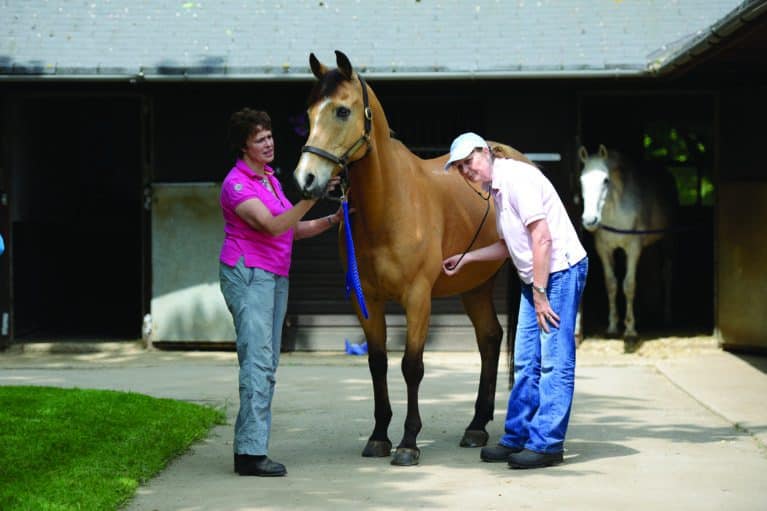
Did you know? A behaviourist will take a detailed history from you to gain information about your horse and your relationship with him, to help them build a clear picture of what may be causing the problem behaviour.
How a behaviourist can help
If the source of pain can be identified and treated successfully by your vet, the behaviour problems may also go away, but this is not always the case. Because of the previous pain, sometimes horses need to learn that the stimulus that previously caused them pain no longer does, and this can take time and may require professional help.
Once your vet has given the all clear, the next step should be a call to a qualified equine behaviourist. It’s important to recognise that punishment can indeed appear to stop a behavioural problem initially, but rather than solving the problem for the long term, the most likely outcome is that the behaviour is temporarily suppressed as a result of the punishment and will likely reappear again at a later date, possibly with greater severity. This is commonly seen when horses who are afraid to load are miraculously ‘cured’ of their problems during a short demonstration in front of a crowd using pressure as a method of training the horse to walk forwards into the trailer, regardless of the fear they are still experiencing. While the behaviour of not wanting to load may be suppressed in that context and with that handler, it’s extremely likely that this behaviour will later return when the horse is in a different setting with a different handler, because the underlying emotion – fear – has not been altered.
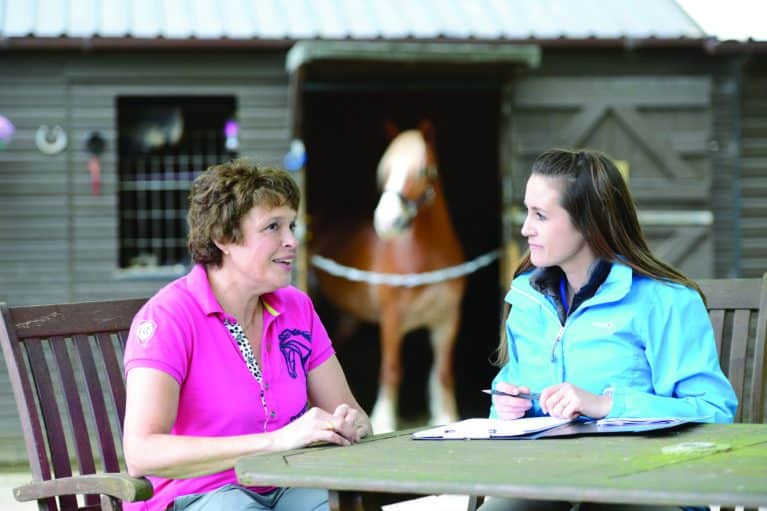
Rather than suppressing your horse’s behaviour, a qualified equine behaviourist will uncover the reason behind the unwanted behaviour and the motivation for your horse continuing the behaviour, and will develop a behaviour modification programme so that you can change your horse’s behaviour for the long term. A full, detailed history will be taken about you, your horse and your relationship with each other. Some of this may seem unimportant or irrelevant to you at first, but this process allows the behaviourist to gain a complete picture of your partnership and any previous experiences that may be contributing to the unwanted behaviour, as well as any aspects of the problem that may require the help of another professional, such as referral back to your vet.
Any treatment programme will take into account not only the unwanted behaviour, but also your horse’s management routine. We all know that for us to remain in a positive mental state, we must maintain equilibrium throughout all aspects of our lives. Our home life, family, friends, work life, diet, exercise and mental stimulation all contribute to our mental wellbeing and the same is also true for horses. In some instances an equine behaviourist may be able to recommend a simple alteration to your horse’s management to eradicate the unwanted behaviour. In other cases they’ll be able to provide you with recommendations for improvements in management as well as a behaviour treatment plan that you, the owner, will carry out with your horse. This allows you to improve your relationship and will create a long-lasting solution to the problem.
Many people want to show the behaviourist how bad their horse’s problems are, but it’s very unlikely that a behaviourist would want you to put yourself or your horse in the situation that causes the horse to display the unwanted behaviour. This is because they should be able to understand why the behaviour is happening and put things in place to prevent it. Demonstrating the seriousness of a behavioural problem may put the handler in danger and is likely to cause considerable distress – two things that the behaviourist would always try to avoid.
Top tip – try to make that all important call to a behaviourist before the problem gets worse – nipping a problem in the bud is much easier than overcoming something that has been a problem for a long time.
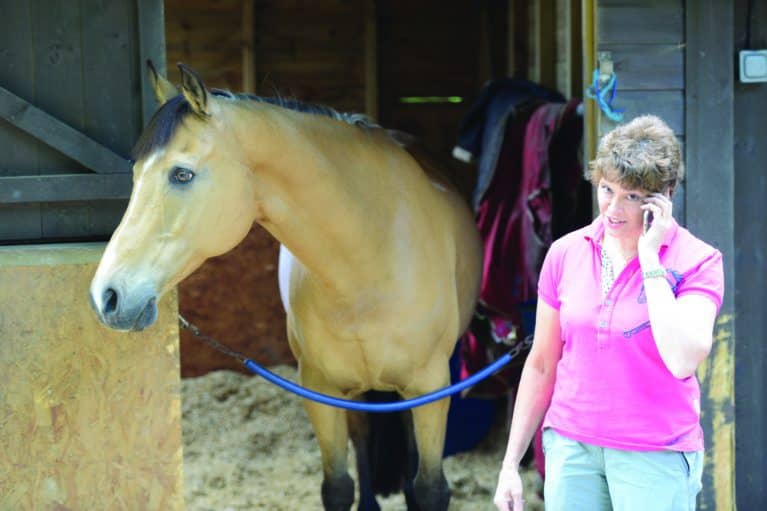
What next?
A reputable equine behaviourist will not only provide you with information during your consultation, but they will also provide a written report and a telephone or email support service to assist you as you work your way through the treatment plan, so that there’s someone to turn to to ensure you remain on the right track. They will offer you follow-up sessions to help you work through the retraining that may be required for your horse, and to supervise what you have put in place and provide constructive feedback and support to ensure a positive outcome for you and your horse. It’s essential for your behaviourist to work closely with your vet and with your consent, the behaviour report will be shared with your veterinary surgeon. This ensures that all professionals who are working with your horse are aware of treatments taking place so that they can work together with you to help you resolve the issues you are having.
Changing your horse’s behaviour takes time and dedication, but should this be any great surprise? After all, if you had a child with challenging behaviour would you expect one session with a child psychologist to turn your child immediately into an angel who never put a foot wrong? Of course not, because with humans we can recognise that changing behaviour is difficult and there’s no one size fits all method that can cure all behaviour problems. We must always be willing to listen to what our horses are telling us through their behaviour and body language, and be prepared to do some detective work to establish why the unwanted behaviour is happening, so that the root cause can be addressed to prevent further practice of the unwanted behaviour.
Changing any behaviour is a process that takes place over time with consistency and kindness, and when approached correctly can result in you having the well-behaved horse you have always wished for. By contacting an equine behaviourist as soon as possible when your horse demonstrates a change in behaviour that you’re concerned about, you can greatly increase your chances of success and reduce the time that it takes to eradicate the unwanted behaviour.
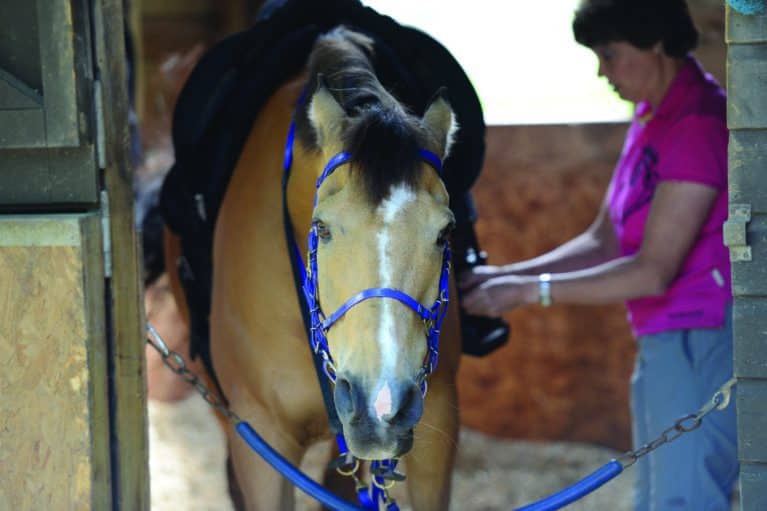
Top tip – it’s important to listen to what your horse tells you through his body language. If he always pulls faces or becomes aggressive when tacked up, this is a sign that must not be ignored. If a vet check gives the all clear and a qualified saddler has approved the tack, behaviour modification can take place to change this pattern of behaviour.
Choosing a behaviourist
It can be a daunting task looking for a reputable equine behaviourist to come and help you, and this is made worse by the fact that at the present time the animal behaviour industry is unregulated – this means that anyone can call themselves a ‘behaviourist’ despite having no relevant qualifications or experience, because there is no regulatory body. There is a great deal of work currently going on to develop a regulatory body for the animal behaviour industry and it looks promising that this will happen in the not too distant future, which will greatly help owners in selecting a suitable behaviourist. The Association of Pet Behaviour Counsellors and the International Association for Animal Behaviour Consultants both have a growing number of equine behaviour consultants who are required to demonstrate a high level of understanding of learning theory and behaviour through rigorous membership processes, and their members are required to adhere to a strict code of conduct in their work. The Equine Behaviour and Training Association also provides information on how to ensure you select an appropriate behaviourist to help you and your horse.
Your Comments
One thought on “When to call a behaviourist”
Leave a Reply
You must be logged in to post a comment.



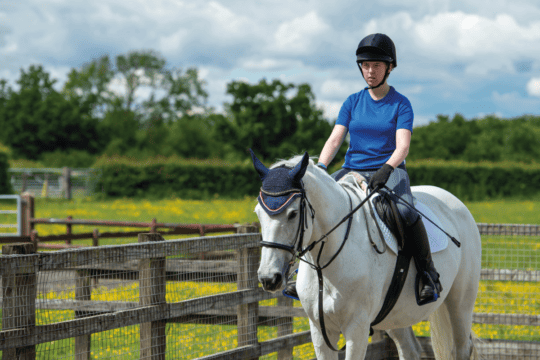
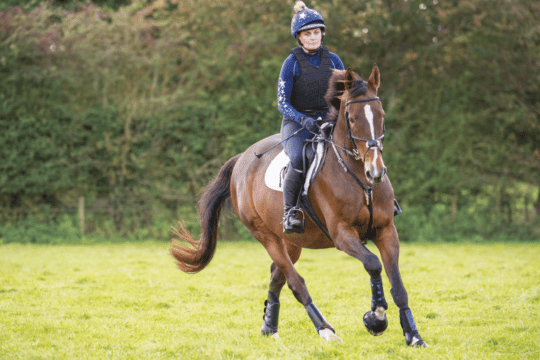
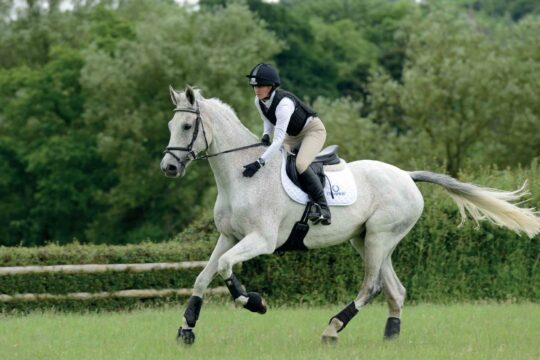









I have a 12hh gypsy cob on loan. He has a bad habit of biting. He does not nip or bit me if I am in a vulnerable position. Could you advise please